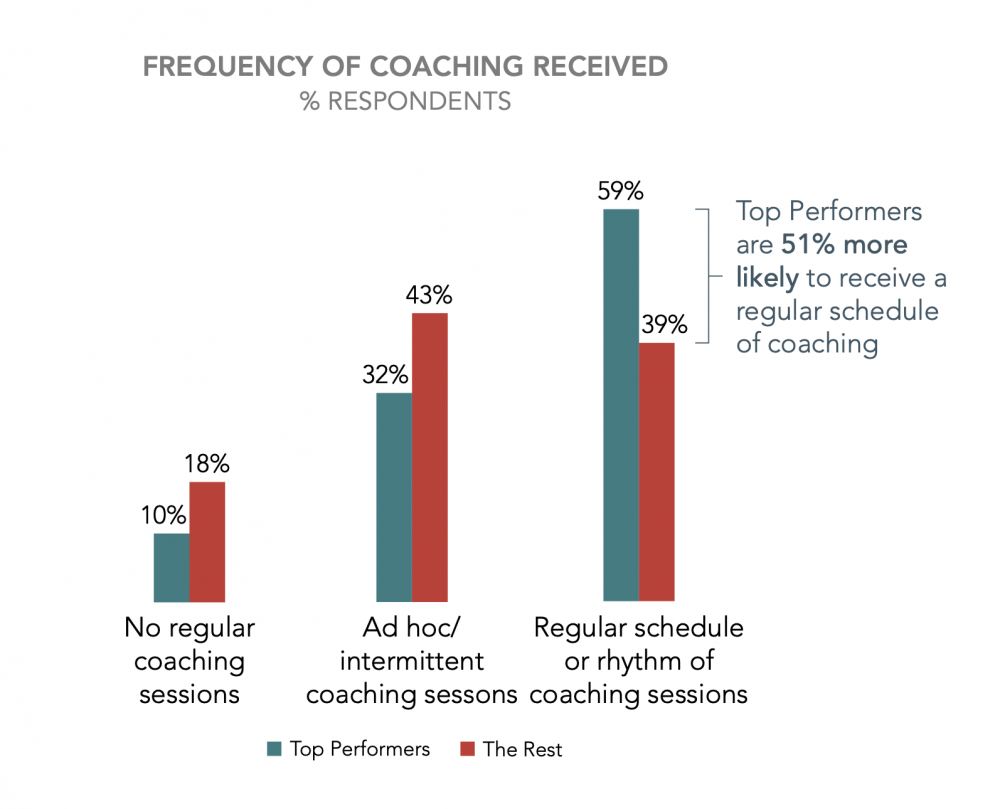
The most influential factor in buyer purchase decisions is a seller’s ability to lead a thorough and impressive needs discovery.
But three out of four buyers are disappointed with the needs discovery skills demonstrated by sellers.
Sellers talk too much, make assumptions, ask irrelevant questions, and don’t demonstrate an understanding of the buyer’s world and needs. Only 26 percent of buyers say sellers are competent listeners.
You can see how this would hurt sales results. What can you do when your sellers don’t perform well in the areas that matter most to buyers? You need to do more than offer them general advice such as, “Ask better questions,” “Improve your listening,” or “Demonstrate a better understanding of buyer needs by summarizing key points.”
To turn things around and improve the needs discovery skills of your team, give them systematic coaching on effective sales conversations.
Studies show that the best sellers receive a regular, ongoing schedule of sales coaching, and the best sales managers deliver coaching regularly. In Skills and Behaviors of Top-Performing Sales Managers and Sellers research, the RAIN Group Center for Sales Research found that top-performing sellers and sales teams are 51 percent more likely to receive coaching on a regular, ongoing schedule.

Further, the top-performing sales managers are 52 percent more likely to excel at coaching sellers to lead great sales conversations.
This data may convince you that implementing a regular rhythm of sales coaching can help boost your team’s sales results, but how do you do it?
How to Coach for Better Sales Conversations
Here are a few ways sales managers can coach sellers on sales conversations:
- Observe sales calls and meetings with buyers: This includes ride-alongs or listening to/viewing recorded sales meetings.
- Hold live simulations: Run a one-on-one or small group simulation with your sellers. Set the scenario and take on the role of a typical buyer. Present challenges to your sellers along the way and throw curve balls to see how they respond. If it’s a small group, peers can review how the sellers did and offer their perspectives and feedback. Peer learning can be a powerful coaching tool.
- Share recorded simulations: Another way to conduct a simulation is through technology. For example, we use Allego’s “hot seat,” where sellers are prompted to record themselves responding to buyer prompts or questions. These recordings then can be shared with managers to review and provide feedback.
- Provide AI-driven coaching: Many artificial intelligence (AI) technologies allow you to highlight good and bad phrases, track the number of times everyone on the call speaks, record the speed of speech, and track filler words. You can record live calls or simulations and provide immediate feedback via a virtual coach.
- Share best practices: Did one of your reps lead a great sales call? Share it with the team.
What Coaches Should Look for
As a coach, you’ve observed a recent sales call. Now what? Here are a few ideas, specifically related to how sellers lead sales conversations, of what to look for and discuss during coaching sessions:
- Time spent talking: The most common mistake we see among sellers is they spend too much time talking. Instead of dominating the conversation, sellers should ask questions. That’s not to say sellers should lead their sales conversations like interrogations. Far from it. But a sales conversation is a golden opportunity to learn more about the buyer’s situation, and you do this by asking the right questions at the right time.
Too many sellers are eager to share their expertise, show buyers how they can help, and prove themselves. They leave little time for the buyer to share what’s going on in their organization. It’s no wonder so few buyers report sellers are competent listeners. Sellers need to lead the sales meeting and balance how much they talk with how much they listen. - Asking powerful sales questions: A great needs discovery goes beyond the question, “What keeps you up at night?” The best sellers use a mix of closed- and open-ended sales questions, specific and broad questions, questions that uncover needs and desires, and questions on the buying process. The questions are tailored to the buyer and are adjusted based on what the seller is hearing.
In our observation, there is a lot of room for improvement when it comes to the questions sellers ask. Given that three out of four buyers are disappointed with the needs discovery skills of sellers, I’d say buyers agree. - Listening and asking follow-up questions: A great way to demonstrate listening and understanding is through asking follow-up questions. For example, “If I understand correctly, A, B, and C are the hot buttons. In my experience, when that’s going on, we also see X, Y, and Z happen. Is that the case here, too?” You’re summarizing what you heard, confirming your understanding, and asking a related follow-up question that demonstrates your knowledge and experience in the area.
- Sharing relevant stories: Advocacy through storytelling is a powerful way to demonstrate your expertise, build credibility, and share your approach. The key here is sharing relevant stories. That means stories from buyers in the same industry or ones who are experiencing the same challenges. The more relevant the story, the greater impact it will have.
- Summarizing: A great summary can show that you’ve heard and understand the buyer’s situation clearly. It also offers the opportunity to ask, “What else?” Often, sellers hear the first need and jump on how they can solve it without digging further into what else is going on or truly understanding the full picture. This results in solutions that don’t quite meet what the buyer is looking for and lost deals.
- Collaborating with the buyer: Is the seller presenting to the buyer or working with them to develop the solution together? The more the seller can involve the buyer in the conversation and in jointly building the solution itself, the greater ownership the buyer will feel to make it happen.
- Next steps: Did the seller provide a clear next step on the call? Too often, calls end abruptly as people bump up against their next meeting. When leading sales conversations, sellers need to manage the call and leave enough time at the end to summarize and confirm the next steps. Are they looking to schedule another meeting? Do it on this call, or you risk the buyer going dark.
When you provide a regular, ongoing schedule of sales coaching on sellers’ sales conversations, you’ll quickly start to see improvements across the board—and your buyers will thank you.


